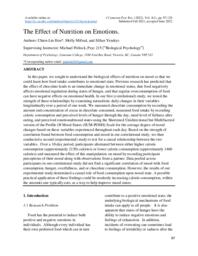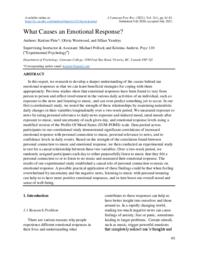Jillian Yendrys
Person Preferred Name
(none provided) (none provided)
Related Works
Content type
Digital Document
Description / Synopsis
In this paper, we sought to understand the biological effects of nutrition on mood so that we could learn how food intake contributes to emotional state. Previous research has predicted that the effect of chocolate leads to an immediate change in emotional status, that food negatively affects emotional regulation during states of hunger, and that regular overconsumption of food can have negative effects on emotional health. In our first (correlational) study, we tested the strength of these relationships by examining naturalistic daily changes in their variables longitudinally over a period of one week. We measured chocolate consumption by recording the amount and concentration of cocoa in chocolate consumed, measured food intake by recording caloric consumption and perceived levels of hunger through the day, rated level of fullness after eating, and perceived emotional/mood states using the Shortened Unidirectional but Multifaceted version of the Profile Of Mood States (SUM-POMS) Scale for the average degree of mood changes based on these variables experienced throughout each day. Based on the strength of correlation found between food consumption and mood in our correlational study, we then conducted a second (experimental) study to test for a causal relationship between the two variables. Over a 10-day period, participants alternated between either higher calorie consumption (approximately 2130) calories) or lower calorie consumption (approximately 1460 calories) and measured the effect of this manipulation on mood by recording participant perceptions of their mood along with observations from a partner. Data pooled across participants in our correlational study did not find a significant correlation of mood with food consumption, hunger, overfullness, and or chocolate consumption. However, the results of our experimental study determined a causal role of food consumption upon mood state. A possible practical application of these findings could be modestly increasing calorie consumption, within the amounts one typically eats, as a way to help improve mood states.
Origin Information
Content type
Digital Document
Description / Synopsis
In this report, we research to develop a deeper understanding of the causes behind our emotional responses so that we can learn beneficial strategies for coping with them appropriately. Previous studies show that emotional responses have been found to vary from person to person and reflect involvement in the various daily activities of an individual, such as exposure to the news and listening to music, and can even predict something yet to occur. In our first (correlational) study, we tested the strength of these relationships by examining naturalistic daily changes in their variables longitudinally over a two-week period. We measured exposure to news by rating personal relevance to daily news exposure and induced mood, rated moods after exposure to music, rated uncertainty of each given day, and emotional response levels using a modified version of the Profile Of Mood States (SUM-POMS) scale. Data pooled across participants in our correlational study demonstrated significant correlations of increased emotional response with personal connection to music, personal relevance to news, and to confidence levels in daily events. Based on the strength of the correlation found between personal connection to music and emotional response, we then conducted an experimental study to test for a causal relationship between these two variables. Over a two-week period, we randomly assigned participants each day to either purposefully listen to music that they felt a personal connection to or to listen to no music and measured their emotional response. The results of our experimental study established a causal role of personal connection to music on emotional response. A possible practical application of these findings could be that when feeling overwhelmed by uncertainty and the negative news, listening to music with personal meaning can help us to have more positive emotional responses, and in turn boost our overall mood and sense of well-being.
Origin Information

